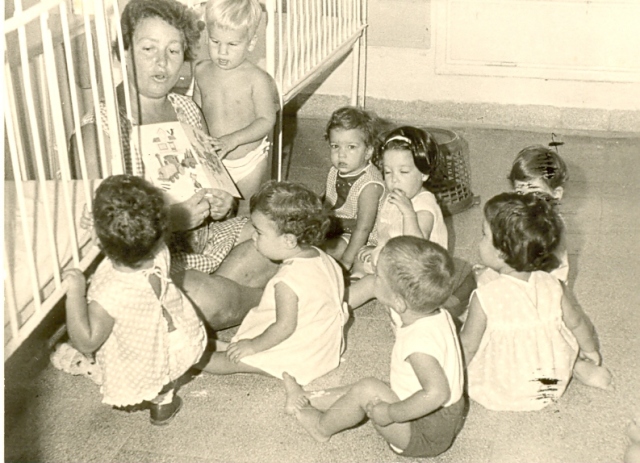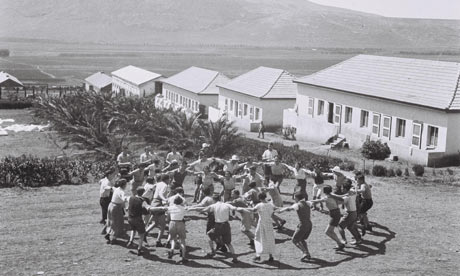KIBBUTZ – KIBBUTZIM (PLURAL)
(https://prezi.com/us7epswcz8sf/the-israeli-kibbutz/)
Kibbutzim are voluntary democratic societies where people live and work together on a non competitive basis. There is communal property, social justice and equality.
“Kibbutz” means communal society in Hebrew. The first kibbutz was established in 1909 by a group from the BILU movement. According to the Jewish Virtual Library, members of the BILU movement previously tried to create a society based on Marxist values and one that lived off the land. These members were fleeing anti-Semitism and wanted to establish a socialist society. After a few unsuccessful attempts, members created the first Kibbutz, which was called Degania. The founders had little to no experience in agriculture, little funding and were working with desolate land. Both the unsuccessful and successful attempts were built on land in Palestine that was bought by the Jewish National Fund.

“From each according to his ability, to each according to his need.”
In the earlier years, the kibbutz movement was based on agriculture. When the State of Israel was established in 1948, this movement played a crucial role in the development of the state. They also helped assimilate the new immigrants.

Family and Gender Roles
In earlier times, children lived in a communal children’s home. Children now stay at their parental homes till high school. Also, there has been increased support for parents to have larger roles in their children’s lives and for more time for women to be home with their children.

Women are equal participants in the labor force and can hold any job. In earlier years, women sought to prove their worth by doing “men’s work”. A majority of women in kibbutzim today prefer jobs in education, health, and other services.

Daily Life in a Kibbutz: Citizens are “Kibbutniks”
People are here voluntarily and are assigned a role for varying lengths in time while more routine tasks like dining hall or washing dishes. The members that work outside of the kibbutz turn over their incomes to the kibbutz. Compared to the earlier times, members now have more individual choice in the community. Members have a certain amount of credit they can spend each year as they wish. Additionally, they celebrate Jewish Holidays and Festivals. Many host films, professional performances and choirs in their auditorium. This is not a utopia that cut itself off from the outside world. Rather, they embraced it while still staying to true to their founding principles.
Government and Expansion
The kibbutzim have democratic systems. They hold weekly meetings in order to decide upon issues. There are elections for administrative members – Each administrative member leads an economic branch for 2-3 years. All inhabitants are provided for with life necessities (food, housing, clothes, social and medical services). Additionally, all property and wealth is communal.

By the early 2000’s, there were over 250 Kibbutzim established throughout Israel. Members make up 2.5% of Israel’s population and it is important to remember that no one is forced to be in the society.
How do they make Kibbutzim work in modern times?
As economic trends changed, the kibbutzim realized that they could not survive on agriculture alone and welcomed in new types of industries to sustain the community. Many Kibbutzim have branched out into other industries to increase productivity
Every child after High School is still required to do mandatory army service. Members have been involved in politics and held office but numbers have dwindled in recent years
Most importantly…. TOURISM is a huge industry for them…. You can volunteer on a Kibbutz for only $690!
Sources:
1. http://www.kibbutzprogramcenter.org/about-kibbutz/
2. http://i-cias.com/e.o/kibbutz.htm
3. http://www.jewishvirtuallibrary.org/jsource/Society_&_Culture/kibbutz.html
4. http://www.jpost.com/Jerusalem-Report/Adult-Children-of-the-Dream
5. http://www.jewishvirtuallibrary.org/jsource/Zionism/bilu.html
I think this was an interesting society to present on because of it’s simplicity. This sounds as if it were the very minimum of any organized society where a small amount of members work together and pool resources for the benefit of their society. You must work for the Kibbutz, you must give back to the Kibbutz, you must live in the Kibbutz, you must share the same religion as the other members of the Kibbutz; other than that, the rules seem pretty open ended and somewhat open to interpretation. I would like to see the effectiveness and longevity of such loose organizations similar to the Kibbutz. The historical context and religious backbone of the Kibbutz maybe translates into the Kibbutz being more selective in its members, but I’m sure hundreds of intentional communities exist today whose rules are similar to the rules explained in your post. Actually, just the other day in the hallways of Baruch I noticed a flyer that was looking for people who were interested in starting a student collective, asking for commitment and a small donation. I wrote in another post that I prefer to read and discuss communities in which there are a lot of rules and laws because they are more interesting, but more relaxed ones like the Kibbutz are have a better shot at attaining a societal utopia today.
This was very interesting for me because of the longevity and because of the simplicity. I think that the fact that there are still Kibbutz is a tremendous feat for the utopian society. I think that they have the most shot at survival as Philip mentioned for the same reasons but also because they are learning to find new ways to generate income. In doing this they are more likely to stay survive longer than the other communities we have discussed. By embracing the outside world they are allowing for growth and the opportunity for new ideas and opportunities as well. It also shows a great deal that the citizens are voluntary and this I think makes the best society.
It is rather boring but I do think that it is very understandable and very appealing to live in a place where you give and share and be nice to one another all the time.